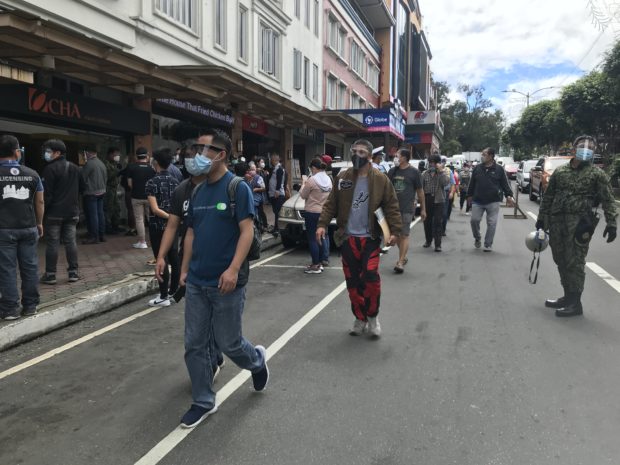
MASKED MEN. Baguio residents go to work, or fulfill chores, while wearing a mask and shield like uniforms. VINCENT CABREZA/ INQ
BAGUIO CITY—The city has again broken its single-day record of coronavirus infections on Monday (Sept. 28), with 68 new patients now undergoing treatment as accelerated tests and aggressive contact tracing locate more carriers in Baguio, the City Health Services Office reported.
With Monday’s confirmed infections, Baguio now has 373 active cases of the novel coronavirus disease (COVID-19), or a total of 847 cases since the pandemic struck.
City epidemiologists have been monitoring a steady rise in transmissions since Aug. 12, after Baguio tested 10 percent of its population, including law enforcers, grocers and bank employees, and in work places like business process outsourcing establishments, according to a Sept. 19 briefing for the National Task Force Against COVID-19.
On Sunday (Sept. 27), local hospitals treated 44 new cases, some emerging from two outbreaks at two villages, including a community surrounding the Baguio slaughterhouse.
The spike in cases occured days before Baguio officially allows its first tourists through its borders on Oct. 1, or six months after the quarantine shut down the country’s leisure industry.
The city has put up public health safeguards and a digital tracking system for Ilocos travelers who will take part in the Ridge and Reef travel corridor in order to revive the local economy.
This initiative allows residents of Baguio and the Ilocos Region to visit beaches and other destinations found in their territories.
Infections continue to occur in Ilocos provinces. On Sunday, 20 new cases were recorded in Pangasinan, while six new cases struck La Union.
During its Monday session, the Baguio City Council passed a resolution urging the Tourism Promotions Board to finance the purchase of rapid antigen test kits.
Baguio is piloting a study of antigen efficacy, which would be cheaper and faster for travellers who are required to undergo routine tests at their own expense.
According to Baguio Mayor Benjamin Magalong last week, the tests can produce results within 15 minutes and costs about a third of the price for the reverse transcription polymerase chain reaction (RT-PCR) tests.
Tourism Secretary Bernadette Romulo-Puyat pledged a P1.8-million fund for the purchase of antigens, he said.
TSB